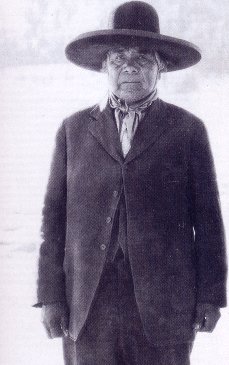Difference between revisions of "Wovoka" - New World Encyclopedia
Mary Anglin (talk | contribs) |
Mary Anglin (talk | contribs) |
||
| Line 17: | Line 17: | ||
Wovoka is also sung about in the song "Ghostdance" by the rock group Nelson in their CD "The Silence is Broken" released in January, 1997. | Wovoka is also sung about in the song "Ghostdance" by the rock group Nelson in their CD "The Silence is Broken" released in January, 1997. | ||
| + | ==Sources to Use== | ||
| + | For article & u/a both, '''CHECK THESE SITES''': | ||
| + | *Toledo, Robert A. [http://www.viewzone.com/wovoka.html Wovoka the Paiute Messiah] ''Viewzone''. Retrieved December 10, 2007. | ||
| − | + | * ''Public Broadcasting Service (PBS)''. [http://www.pbs.org/weta/thewest/people/s_z/wovoka.htm Wovoka, Jack Wilson 1856-1932] Retrieved December 10, 2007. | |
| − | |||
Revision as of 04:04, 10 December 2007
Wovoka (c. 1856 - September 20, 1932), also known as Jack Wilson, was the Northern Paiute religious leader who founded the Ghost Dance movement. Wovoka means “wood cutter” in the Northern Paiute language.
Wovoka was born in the Smith Valley area southeast of Carson City, Nevada, around the year 1856. Wovoka's father may have been the religious leader variously known as “Tavibo“ or “Numu-Taibo” whose teachings were similar to those of Wovoka. Regardless, Wovoka clearly had some training as a shaman. Wovoka’s father died around the year 1870, and he was taken in by David Wilson, who was a rancher in the Yerington, Nevada area. Wovoka worked on Wilson’s ranch and used the name Jack Wilson when dealing with whites. David Wilson was a devout Christian, and Wovoka learned Christian theology and Bible stories while living with him.
Wovoka gained a reputation as a powerful shaman early in adulthood as he was adept at magic tricks. One trick he often performed was being shot with a shotgun, which may have been similar to the bullet catch trick. Reports of this trick probably convinced the Lakota that their “ghost shirts” could stop bullets. Wovoka also performed a levitation trick.
Wovoka claimed to have had a prophetic vision during the solar eclipse on January 1, 1889. Wovoka's vision entailed the resurrection of the Paiute dead and the removal of whites and their works from North America. Wovoka taught that in order to bring this vision to pass the Native Americans must live righteously and perform a traditional round dance, known as the Ghost dance, in a series of five-day gatherings. Wovoka's teachings spread quickly among many Native American peoples, notably the Lakota. The Ghost Dance movement is best known for its role in the Wounded Knee Massacre, in which it caused Indian Agents, Soldiers, and other Federal officials a great deal of consternation and helped to predispose them towards a cautious, wary, and defensive posture when dealing with the Sioux. Important to note is that Wovoka’s preachings included messages of non-violence, but that two Miniconjou, Short Bull and Kicking Bear, instead emphasized the possible elimination of Whites which contributed to the already defensive attitude of the federal officials who were already reacting with fear of the unknown to the Ghost Dance movement.
Wovoka died in Yerington on September 20, 1932 and is interred in the Paiute Cemetery in the town of Schurz, Nevada.
Wovoka is the name of a rock album by the Native American/Chicano band Redbone released in 1974.
A reference to Wovoka is made in the song "I Hear Them All" by "Old Crow Medicine Show" on their album, "Big Iron World", released in August, 2006.
Wovoka is also sung about in the song "Ghostdance" by the rock group Nelson in their CD "The Silence is Broken" released in January, 1997.
Sources to Use
For article & u/a both, CHECK THESE SITES:
- Toledo, Robert A. Wovoka the Paiute Messiah Viewzone. Retrieved December 10, 2007.
- Public Broadcasting Service (PBS). Wovoka, Jack Wilson 1856-1932 Retrieved December 10, 2007.
Further reading
- Michael Hittman, Wovoka and the Ghost Dance, Bison Books 1998, ISBN 0803273088
- John Norman, Ghost Dance, Daw Books 1970, (a fictional account) ISBN 0879975016
See also
- Smohalla
- John Slocum
External link
Credits
New World Encyclopedia writers and editors rewrote and completed the Wikipedia article in accordance with New World Encyclopedia standards. This article abides by terms of the Creative Commons CC-by-sa 3.0 License (CC-by-sa), which may be used and disseminated with proper attribution. Credit is due under the terms of this license that can reference both the New World Encyclopedia contributors and the selfless volunteer contributors of the Wikimedia Foundation. To cite this article click here for a list of acceptable citing formats.The history of earlier contributions by wikipedians is accessible to researchers here:
The history of this article since it was imported to New World Encyclopedia:
Note: Some restrictions may apply to use of individual images which are separately licensed.
